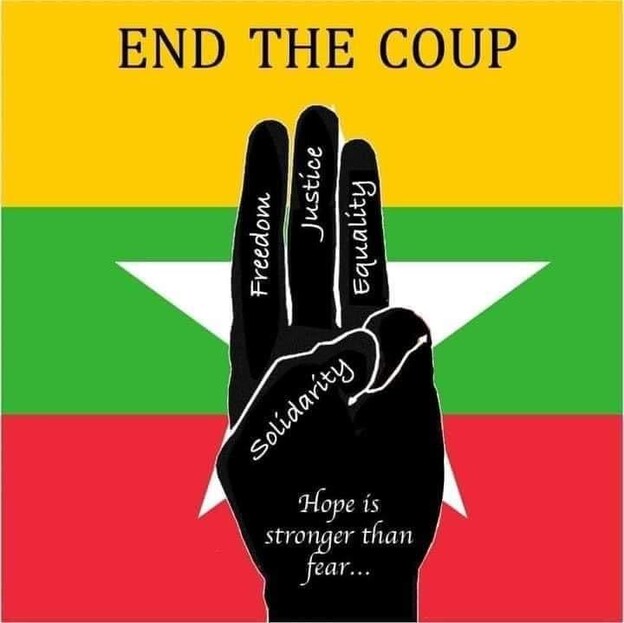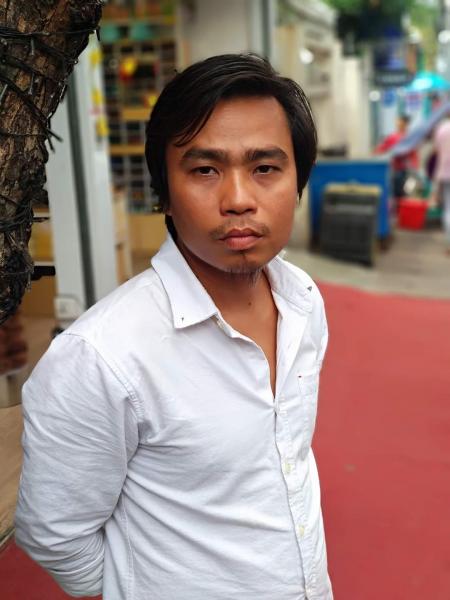
Train a comin': Poems from the Burmese resistance
Zeyar Lynn, Pandora, K Zar Win

(rough translation from the Burmese)
CDM movement [Civil Disobedience Movement]
(Feb. 15, 2021)
(written in English)
Voices curse, making cacophonies.
Are you gonna run us down? Run me down? Run us down!
Trains will roar.
(written in English, Feb. 27, 2021)
Don't bow down and you won't bust your gut.
(Feb. 28, 2021)
Obituary: Poet K Zar Win (1982-2021)
ko ko thett Poet K Zar Win, whose poems have appeared in Myanmar magazines since 2004, was killed in a protest in Monywa yesterday (3 March, 2021).
Poet K Zar Win, whose poems have appeared in Myanmar magazines since 2004, was killed in a protest in Monywa yesterday (3 March, 2021).
K Zar Win was born to a peasant family in Latpadaung near Monywa in 1982. Latpadaung is a contentious site where several villages were displaced by Wanbao Copper Mining Ltd. of China. The Myanmar police’ violent repression of Latpadaung villagers’ struggle against the Chinese farm in the 2010s revealed the dark side of “the democratic transition” of Myanmar.
K Zar Win was one of the university students who rallied from Mandalay to Yangon in the 2015 campaign, “Long March for Educational Reforms.” Consequently he spent one year and a month in prison, during which he published “My Reply to Ramond”.
Following is a poem from "My Reply to Ramond" I circulated in January.
K Zar Win wrote to tell me how he enjoyed the translation.
I simply replied,
"Take care, bro."
A letter from a jail cell
Dear Father,
the River, whose stomach
was cut open,
has declared war
on our tiny house on the bank, hasn’t she?
Right in front of the house
you must be looking out for someone
who will help you with
embankment poles
to straighten the river,
to fill her holes with
sandbags.
In the murky water,
which rises like a bamboo lance,
you must be gazing at
the sesame plantation —
laden with fruits
ready for harvest.
You must be thinking
a fistful of rice in your mouth
is about to be fingered out.
Maybe you will find solace
in religion, contemplating
our five foes.
Maybe you will
think of the void
a son’s labour can fill.
One son, two daughters and one son;
The eldest is a poet in prison,
the first daughter, a school teacher,
the second, a graduate in the kitchen,
the youngest, a student.
Your poet son,
is he even employable
as the dah you use to clear weed?
Forgive nothing, Father.
Nothing!
“Son, Pho Chan,
why do I hear noises behind you?”,
you asked on the phone.
“I am at the bus stop
to post a manuscript to a journal,” I lied.
From your liar son in the dock
to thugs who sweeten you
with the tips of their tongues,
“To our benefactor peasants …”,
because they want to have you from behind,
hate them all, Father.
Hate them all.
A thief is
unarmed.
A thug is
armed to the teeth.
If thieves are ungovernable,
if thugs are ungovernable,
what’s the point of government?
Whatever happens to the jungles
whatever happens to the mountains
whatever happens to the rivers
they don’t care.
They love the country
just the way they love to grate a coconut,
from inside out,
for coconut milk.
Plinth by plinth, to make their throne taller,
they will point their guns at the urna
on the Lord Buddha’s forehead.
Their class is that crass.
To cuss at that class
if your religion forbids you
allow me to lose that religion.
I will turn the air blue
on your behalf.
Maybe you don’t know yet.
your son was
set up
for demanding the so-called police
not to harm ordinary citizens.
Someday
your son, who is not a thief
nor a thug
will become employable,
good as your dah that clears weed.
For now, Father,
keep gazing at the plantation
you’d ploughed with your naked shoulders.
Keep singing
the anthem of
The Peasant Union.
Yours ever,
K Za Win
Cell 1, Section 10
Thayawaddy Prison
Zeyar Lynn
Some days you think you're dead
Some days you feel you're dead
Some days you know you're dead
Some days a kind of death moves you. People around you ask, 'Hey, what gives you that aliveness?'
Some days your shell cracks. An essential part of you seeps out. To dry up. To evaporate. To take something valuable to you from you and never to return. To leave a hole in you. To make you a hole.
Some days you're not even there nor anywhere but people say they saw you here and there. Like anyhere or anythere.
Min San Wai
Hole
translated by ko ko thett
There’s a hole the size of a pencil tip
in the bamboo wall of our house.
Not so long ago Little Daughter
piled thanaka on her cheeks and
disappeared into that hole.
She is gone for a long time.
Mother can’t wait any longer.
She peeps into the hole and finds
herself looking down a gun muzzle.
In the background is a gala dinner,
where Myanmar in blood and gore
is chopped up and served.
At the top of the grand table sits
the pagoda donor, sipping a
glass of Little Daughter’s blood.
The dead wail in the darkness outside.
Mother passes out, repeating
My Little Daughter, my Little Daughter!
Father gets curious and looks into the hole.
Family members take turns
peeping into that hole.
Today each and every person in this country
has a tiny hole as big as a pencil tip
in their chest.
- “Hole” is dedicated to Pan Ei Phyu, a fourteen-year-old girl who was killed by a bullet that came through the bamboo wall of her house in Meiktila, Myanmar on 3/27/2021.
- “Pagoda donor” is my translation for someone who builds a pagoda. Pagodas are costly projects, both to build and maintain. Only Burmese monarchs and queens in the past, and Burmese generals and extremely wealthy people in present-day Myanmar, can afford a pagoda.
https://adimagazine.com/articles/hole/